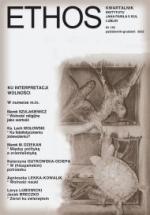 zobacz powiększenie | Dorota CHABRAJSKA, So, Is It, After All, About the Appreciation of Necessity...? Cena brutto: 7,00 PLN za szt. |
|
The essay explores parallels between the Engelsian concept of freedom as appreciation of necessity, applied by communist regimes for purposes of social manipulation, and the tendency, increasing in modern culture, to introduce formal (in particular legal) regulatory mandates in all areas of life, which affects decisions taken by individuals in the public space as well as in their personal or even private lives. The ongoing cultural changes effectively reduce the space in which human free will can be exercised and render traditionally conceived freedom as opposed to values such as diversity, equity, and inclusion, as well as to currently dominant ideologies or narratives, for instance that of climate alarmism. As a result, it is believed that a human act, in order to be genuinely free, needs to be rid of its “unregulated” nature and must—as was the case in Engels’s concept of freedom—take the shape of a factor working within a pre-conditioned, deterministic universe, thus being merely an acknowledgement of the “mandatory,” necessary laws and rules to which the human will is bound to be conformed. Keywords: free will, determinism, Friedrich Engels, Václav Havel, Western culture, truth-based cognition, human dignity, subjectivity Contact: John Paul II Institute, Faculty of Philosophy, John Paul II Catholic University of Lublin, Al. Racławickie 14, 20-950 Lublin, Poland | |
